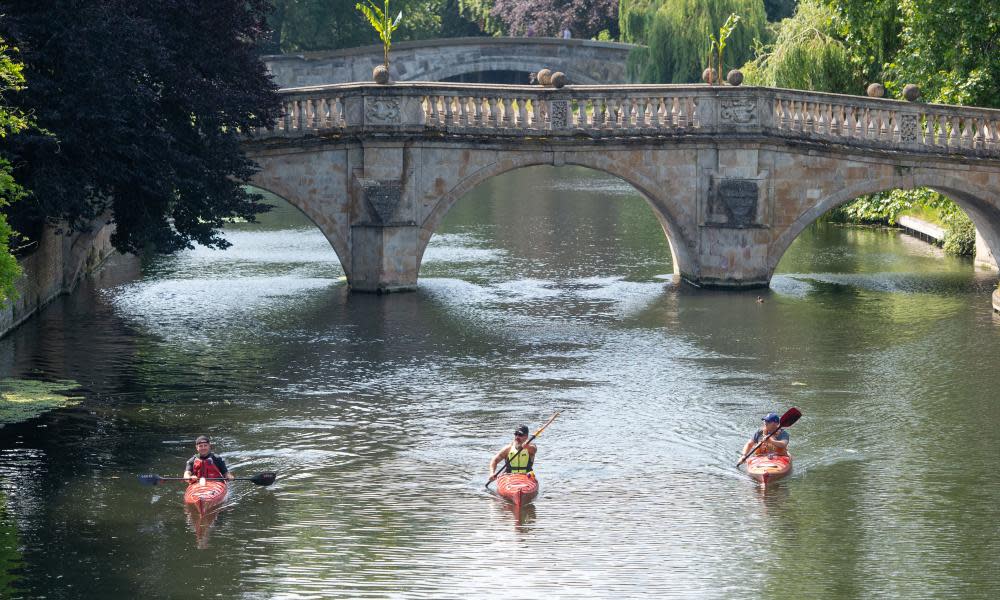Up the creek … with 19,000 paddles as UK takes to the water

To celebrate his 40th birthday last week, Adam Partington and his partner, Gemma Cann, took to the River Cam on new paddleboards with a goodies hamper strapped to the front.
After gliding past Cambridge’s ancient colleges, the couple stopped at Grantchester Meadows at the edge of the city for a picnic and celebratory glass of bubbly before paddling back to their starting point.
“It’s so liberating and refreshing,” said Partington – who has been working from home near Bingham, Nottinghamshire, since March – of his new pursuit. “It has its own pace. We’ve had fewer options since lockdown, so I’m not surprised so many people have taken it up.”
The couple are among thousands who have taken to Britain’s inland waterways in the past few months. British Canoeing has seen a 40% rise in members since last year, with 19,000 people signing up in the past three months.
The Canal & River Trust, the Outdoor Swimming Society and the Angling Trust are all reporting a surge in interest.
Red Paddle Co, a paddleboard retailer, said it had seen an unprecedented 300% rise in sales and enquiries, making 2020 its busiest year and leaving stores short of stock.
“The recent boom has been driven by the accessibility of the sport, gyms being closed for so long, the desire to do something socially with friends and the sun shining,” said co-founder John Hibbard.
Jenny Spencer of British Canoeing said: “Literally, from the day lockdown was eased a little bit and we were allowed outdoors, paddle sports just took off. People had spent a long time being cooped up indoors, and some were getting fed up with running and cycling.”
A big proportion of new paddlers are families, and almost four in 10 are female. Growth has been mainly among those aged between 30 to 60, said Spencer.
Thousands of miles of waterways in the UK mean most of the population is within reach of a river or a canal. “It’s peaceful and calming. People like having a new perspective on their surroundings,” she said.
And it helps that social distancing is built into paddle sports.
It’s been a lot of fun exploring the waterways. It’s exercise, relaxation and fresh air all rolled into one
Jonathan Sullivan, paddleboarding convert
Jonathan Sullivan, 40, had been “toying with the idea for years” but had never got round to venturing out on the Trent and numerous canals around his home in Long Eaton, Derbyshire.
Then lockdown happened. Sullivan and his wife, Michala, juggled working at home with caring for and home-schooling their two children, six-year-old William and Niamh, almost five.
“We ran out of ways to entertain them. There wasn’t much to do, or many places to visit,” Sullivan said.
They invested in a three-person inflatable kayak and a paddleboard. “It’s been a lot of fun exploring the waterways.” The family has gone wild swimming and taken picnics on paddling trips. “It’s a great way to spend time together.”
Sullivan has also used paddling as a way to de-stress after long days at his computer. “I go on my own in the evening. It’s exercise, relaxation and fresh air all rolled into one.”
A licence is required to paddle on waterways maintained by the Environment Agency and the Canal & River Trust, and the Norfolk Broads. In Scotland, there is a “right to roam” over land and water.
Related: The perfect post-lockdown activity: paddleboarding in Cornwall
Some 95% of rivers in England are in private hands with limited access. Less than 2,000km out of 57,600 have a statutory public right of navigation and are open for people to go wild swimming or canoeing.
Two members of the House of Lords – Baroness Tanni Grey-Thompson, the former Paralympian athlete, and Liberal Democrat peer Lord Addington – have proposed amendments to the agriculture bill, currently going through parliament, to allow the public better rights of access to rivers.
Grey-Thompson said water activities helped people’s mental health and gave them a greater connection with nature. “There is something very calming about being near water – the sound of it, on a summer’s day, there is nothing that is more perfect,” she said in a recent podcast.


